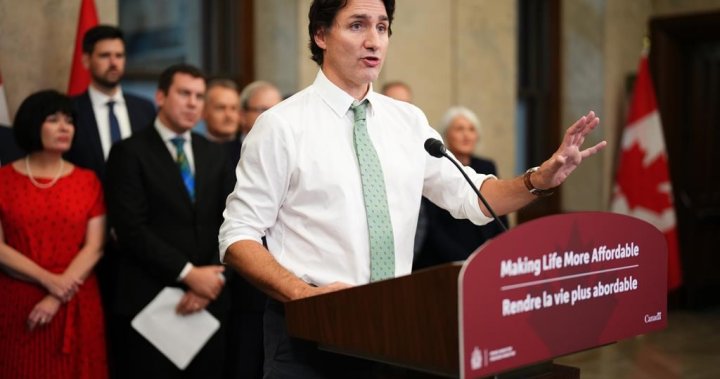Eligible Canadians will receive their first carbon pricing rebate of 2024 from the federal government starting Monday.
The rebate, officially called the Climate Action Incentive payment, will be applied to people living in provinces where the federal carbon tax is applied.
Residents in Alberta, Ontario, Manitoba, Saskatchewan, New Brunswick, P.E.I, Nova Scotia, and Newfoundland and Labrador will automatically receive the rebate through direct deposit or by cheque, as long as they have filed their income tax and benefit returns.
British Columbia, Quebec and the Northwest Territories do not participate in the federal carbon pollution pricing system, so residents are not eligible to receive the rebate.
The federal carbon pricing plan includes a 10 per cent supplement for residents in small and rural communities, beyond the base payment. Prime Minister Justin Trudeau announced in October that the amount will be doubled to 20 per cent in April this year as a form of recognition of the increased energy needs and reduced access to cleaner transportation options in those jurisdictions.
The amount received depends on the size of the household. According to Environment and Climate Change Canada (ECCC), a family of four will receive the following pollution price rebate amounts:
- $386 in Alberta
- $264 in Manitoba
- $184 in New Brunswick
- $328 in Newfoundland and Labrador
- $248 in Nova Scotia
- $244 in Ontario
- $240 in Prince Edward Island
- $340 in Saskatchewan
Individuals in New Brunswick will receive $92. Two-person households with a spouse or common-law partner will get $46, or $23 per child under 19.
Get the latest Money 123 news.
Sent to your email, every week.
In Alberta, an individual can expect $193, a spouse or common-law partner $96.50 and $48.25 per child under 19.
In Manitoba, it’s $132 for an individual, $66 for a spouse or common-law partner and $33 per child under 19.
In Ontario, an individual can expect $122, a spouse or common-law partner $61 and $30.50 per child under 19.
In Saskatchewan, it’s $170 for an individual, $85 for a spouse or common-law partner and $42.50 per child under 19.
In Newfoundland, an individual can expect $164, a spouse or common-law partner $82 and $41 per child under 19.
In Nova Scotia, it’s $124 for an individual, $62 for a spouse or common-law partner and $31 per child under 19.
In Prince Edward Island, an individual can expect $120, a spouse or common-law partner $60 and $30 per child under 19.
The ECCC says all P.E.I residents are considered to be living in a small and rural community, so the amounts received in the region will also include the 10 per cent rural supplement.
Ottawa has said that the rebate is meant to offset the cost of federal pollution pricing and is part of the federal government’s goal to cut emissions by 40 per cent by 2030, and achieve net-zero emissions by 2050.
The ECCC said in a news release Friday that pollution pricing is expected to contribute to about a third of the total reductions in emissions that will occur from now until 2030.
“The federal pollution pricing system is not only supporting the everyday affordability challenges of Canadians, but is a key part of our plan to fight climate change,” Minister of Environment and Climate Change Steven Guilbeault said in the same release.
The agency says low and middle income households will benefit most from the rebates, with eight out of 10 households set to receive more money back through the payment than they typically pay as a result of the federal pollution pricing system.
“The direct proceeds from the federal pollution price are returned to the jurisdiction from which they were collected to help with cost-of-living challenges while keeping the incentive to pollute less,” the ECCC said.
Ninety per cent of direct proceeds from Ottawa’s fuel charge are delivered to individuals and families through pollution price rebates, which are made to eligible Canadians every three months. The remaining 10 per cent of proceeds are provided to emissions-intensive, trade-exposed, small and medium sized enterprises and Indigenous groups.
“Pricing carbon pollution is just one part of Canada’s plan to prevent the worst impacts of climate change and build a sustainable future for everyone,” the ECCC said.
© 2024 Global News, a division of Corus Entertainment Inc.


